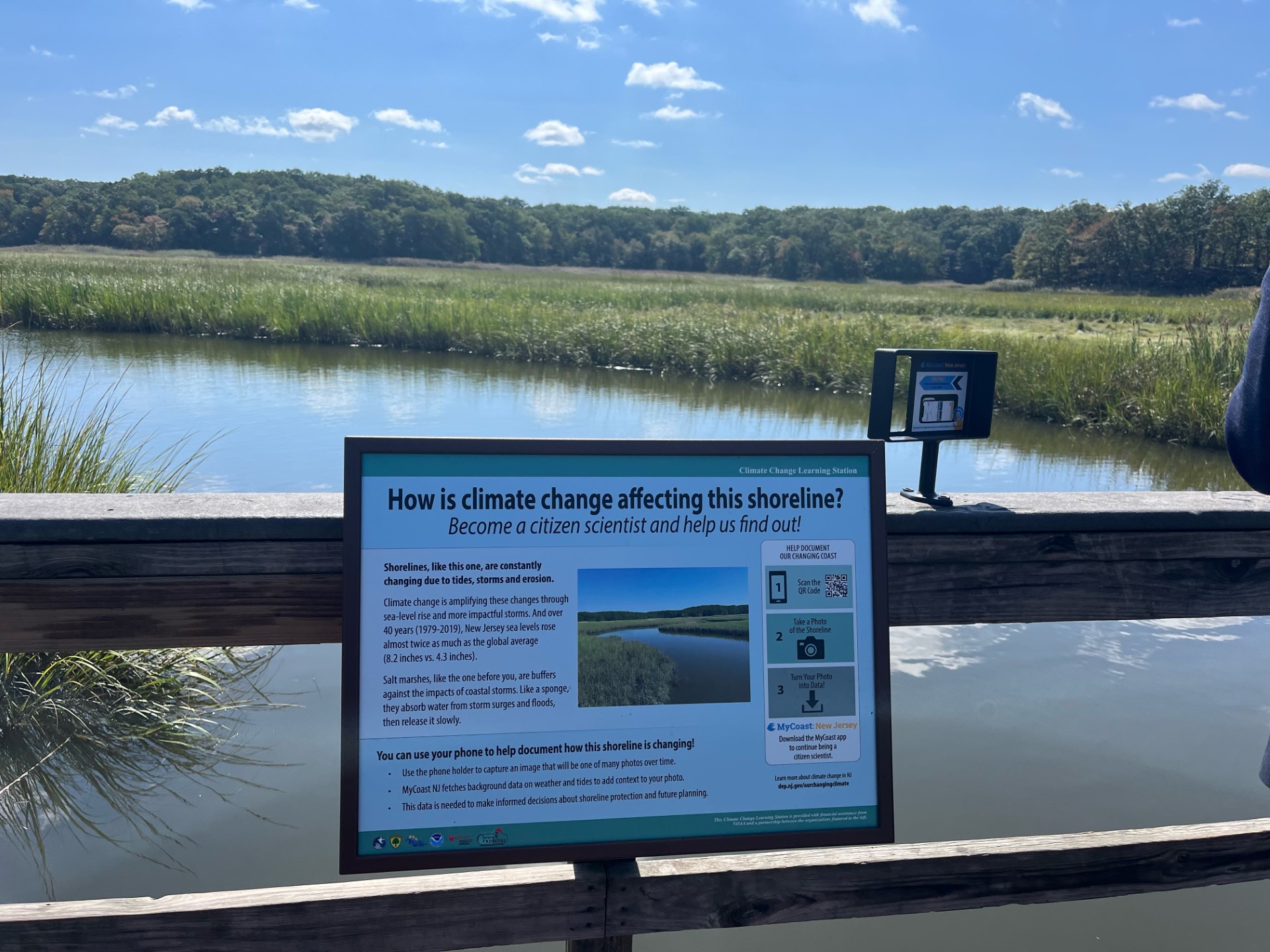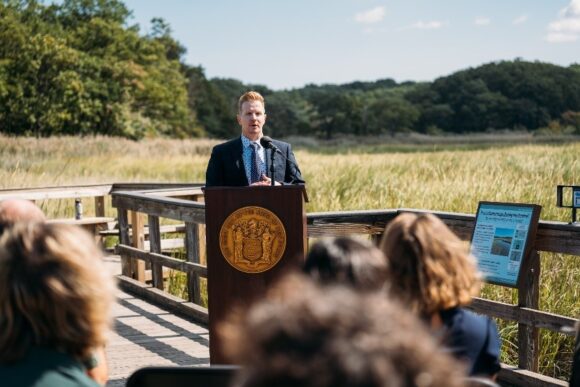
Climate Change Learning Station in Cheesequake State Park in Middlesex County unveiled by NJ DEP to mark Climate Week in New Jersey. Courtesy of NJDEP.
Editor’s note: Photo documentation stations resulted from a partnership with Rutgers DMCS, JC NERR, NOAA, and the MyCoast New Jersey website. This article first appeared on the DEP website.
Marking Climate Week in New Jersey, Environmental Protection Commissioner Shawn M. LaTourette unveiled the first of five Climate Change Learning Stations in New Jersey’s state parks at Cheesequake State Park in Middlesex County. Climate Week runs from Sept. 17 through Sept. 24 and provides an opportunity for the public to learn about the many ways climate change is threatening the planet and the steps that can be taken to become more resilient and mitigate its impacts.
The learning stations are the first in a series of installations planned for state parks. Each of the five learning stations are located along shorelines and provide visitors with a snapshot overview about climate change, changing shorelines, and coastal resilience and defense. Additionally, each learning station features a MyCoast photo documentation station that encourages visitors to participate in a citizen science project to chronicle climate change impacts over time.

Environmental Protection Commissioner Shawn M. LaTourette unveiled the first of five Climate Change Learning Stations in New Jersey’s state parks at Cheesequake State Park in Middlesex County. Courtesy of NJDEP.
“It is often said that seeing is believing,” said Commissioner LaTourette. “It is our hope that these learning stations will provide park visitors a window into the realities of climate change, as well as a source of motivation to learn more about climate change and the steps they can take in their personal lives to prepare and help mitigate its effects. I applaud the State Park Service and our climate resilience experts at the DEP for bringing these innovative and informative learning stations to some of our most popular parks.”
Four additional learning stations can be found at Cape May Point State Park in Cape May County, Island Beach State Park in Ocean County and Liberty State Park in Hudson County.
All five learning stations are currently operational and located on a diversity of shorelines – oceanfront coastlines with sand dunes on Island Beach State Park’s ADA accessible Fisherman’s Walkway and Cape May Point State Park’s ADA beach-access walkway; the bayside of Island Beach State Park’s Johnny Allen’s Cove Trail; along a salt marsh on Cheesequake State Park’s crabbing bridge; and at the northern edge of Liberty State Park, overlooking a partially built urban shoreline.
Each Climate Change Learning Station informs readers about climate change effects on shorelines like the one they are visiting. Sand dunes and salt marshes act as natural coastal defenses and are highlighted throughout the signage. A link to the DEP Climate Change website is displayed for further information on how climate change is impacting New Jersey.
“Adding elements to New Jersey’s state parks, forests and historic sites that serve as teaching moments for park users are taking place throughout the state,” said John Cecil, Assistant Commissioner for State Parks, Forests & Historic Sites. “These Climate Change Learning Stations are meant to assist visitors of all ages in contemplating the impacts of climate change on New Jersey’s natural resources, the places we cherish and communities broadly.”
“Sea-level rise will undoubtedly change the way we see and experience our coastal communities and landmarks,” said Chief Climate Resilience Officer Nick Angarone. “Documenting changes in our shoreline over time is the first step to understanding how we can best protect and preserve our coasts for generations to come.”
To encourage park visitors to become more involved in monitoring the changing shorelines and effects of climate change, the learning stations include MyCoast photo documentation stations. At the stations, park visitors can capture important visual impacts from weather, tides and other climate-related events.
The addition of the photo documentation stations was made possible through DEP’s partnership with Rutgers University’s Department of Marine and Coastal Sciences and the Jacques Cousteau National Estuarine Research Reserve, the National Oceanic and Atmospheric Administration, and the MyCoast New Jersey website.
MyCoast New Jersey is a crowdsourcing platform that allows citizens to use digital photography to study and visualize environmental change for years to come. Through these photo documentation stations, the DEP and interested stakeholders can better understand long-term changes to the state’s shorelines and inform management decisions.
According to the DEP’s 2020 NJ Scientific Report on Climate Change, sea-levels in New Jersey are likely to rise 2.1 feet by 2050 and 5.1 feet by the end of the century. The data collected through the MyCoast photo documentation stations will allow everyone from park users to scientists to view these changes over time.
Funding for the Climate Change Learning Stations and MyCoast photo documentation stations was provided by the National Oceanic and Atmospheric Administration and the New Jersey Coastal Management Program, DEP – in partnership with Rutgers University’s Department of Marine and Coastal Sciences – and the Jacques Cousteau National Estuarine Research Reserve.
NJDEP created a video to introduce the new Climate Change Learning Stations.
The DEP’s newly updated climate change website includes a more user-friendly homepage and a collection of interactive story maps titled Climate Change in New Jersey: Impacts and Effects, which provide up-to-date climate change research, build upon the findings of the 2020 NJ Scientific Report on Climate Change, and use a direct, easy-to-understand format that includes maps, photos, graphs, animations and more.
To learn more about MyCoast New Jersey, visit mycoast.org/nj.
To learn more about New Jersey’s Parks, Forests & Historic Sites, visit njparksandforests.org/.
Like New Jersey’s State Parks, Forests & Historic Sites page on Facebook at facebook.com/newjerseystateparks/.
Follow the New Jersey State Park Service on Instagram @newjerseystateparks
Follow the New Jersey Coastal Management Program @NJCoastalManagement
Follow Commissioner LaTourette on Twitter and Instagram @shawnlatur and follow the DEP on Twitter @NewJerseyDEP, Facebook @newjerseydep, Instagram @nj.dep and LinkedIn @newjerseydep.

